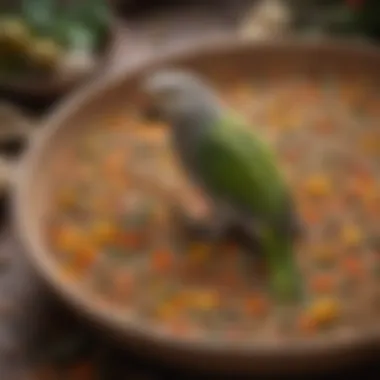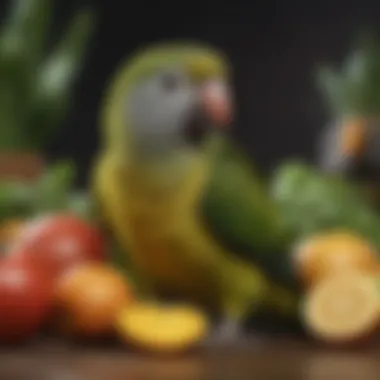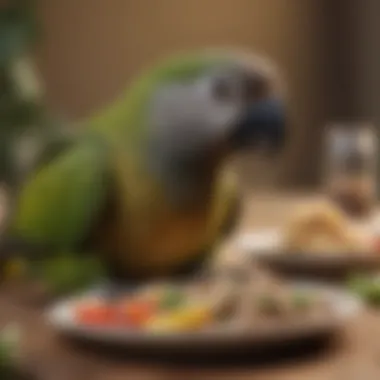Essential Nutritional Insights for Senegal Parrots


Intro
Understanding the nutritional needs of Senegal parrots is crucial for their overall health and longevity. These birds are not only vibrant and social pets but also require a carefully planned diet to thrive. The right combination of nutrients can enhance their energy levels, improve their feather quality, and support their immune system. In this article, we will explore the essential dietary aspects specific to Senegal parrots, ensuring that pet owners can provide the best care possible for their feathered companions.
Understanding Your Pet
Pet Behavior Basics
Senegal parrots are known for their playful and curious nature. They enjoy interacting with their environment and require mental stimulation to prevent behavioral issues. Understanding these behaviors is vital in shaping a proper diet plan. Providing food that encourages foraging can promote better mental health and fulfill their innate needs.
Common Breed Characteristics
Senegal parrots are medium-sized with a distinct personality. They often exhibit a variety of vocalizations and can become quite attached to their owners. Their playful spirit means that they thrive on engagement, which can also be integrated into their feeding routines. Noting these characteristics can influence how their diet should be structured.
Species-Specific Needs
Each species of parrot has its unique dietary requirements. Senegal parrots primarily need a blend of grains, fruits, vegetables, and proteins. Avoiding foods high in fat and sugar is essential, as these can lead to obesity and related health problems. Understanding these needs helps in crafting a tailored diet that promotes well-being.
Pet Care and Maintenance
Feeding Guidelines
Establishing a feeding routine is fundamental. Senegal parrots should be provided with a high-quality pellet diet as a base. Fresh vegetables like carrots, spinach, and bell peppers should be added daily. Fruits such as apples, and berries can be offered as treats in moderation. It's important to avoid foods like avocado, chocolate, and caffeine, which are toxic to parrots.
Grooming Essentials
Regular grooming is key to maintaining a Senegal parrot's health. This includes wing clipping if necessary, regular bathing, and nail trimming to prevent overgrowth. Proper grooming helps keep the bird comfortable and avoids any unhygienic conditions that could arise from neglect.
Hygiene Practices
Maintaining a clean environment is critical. Cage cleanliness should be a priority. Uneaten food and waste must be removed daily, and the cage should be cleaned with bird-safe disinfectants. This prevents the buildup of bacteria and supports a healthy living environment.
Training and Development
Basic Commands and Skills
Training Senegal parrots can be very rewarding. Teaching simple commands such as
Understanding Senegal Parrots
Understanding Senegal parrots is essential for any owner interested in the health and well-being of these vibrant birds. These parrots, known for their playful nature and engaging personalities, require a carefully considered diet to thrive. Their dietary needs are not just about satisfying hunger; they play a significant role in maintaining their physical health, behavior, and overall mood. Pet owners must grasp the fundamentals of the Senegal parrot’s biology and behavior to make informed decisions about their diet.
Origin and Habitat
Senegal parrots originate from the subtropical regions of West Africa, with a range that includes countries like Senegal, Gambia, and Guinea. They primarily inhabit woodlands, savannas, and agricultural areas. The natural diet of Senegal parrots consists of fruits, seeds, nuts, and occasionally some insects. This variety in their natural habitat influences the types of food they need in captivity. Providing a diet similar to what they eat in the wild is crucial for their health. It contributes to their enrichment and satisfies their instinctual behaviors, which might otherwise be lost in a domestic environment.
Behavioral Traits
Senegal parrots are known for their lively and affectionate behavior. They form strong bonds with their owners and are often quite social. Their playful nature means they require stimulation through interaction and activities. A well-nourished Senegal parrot is more likely to exhibit positive behavior and engage actively in play. Diet can have a direct impact on their mood and energy levels. A deficiency in essential nutrients can lead to lethargy or behavioral problems. Thus, understanding their behavioral traits helps pet owners provide a balanced diet that supports not only physical health but also mental well-being.
A well-balanced diet fosters a happy and playful Senegal parrot, enhancing both its health and interaction with its owner.


Nutritional Requirements
Understanding the nutritional needs of Senegal parrots is vital for their overall health and well-being. A proper diet can significantly enhance their quality of life, longevity, and vibrancy. Each nutrient plays a unique role in ensuring these birds thrive. When pet owners grasp what makes up a balanced diet for their Senegal parrots, they can make informed decisions regarding food selection and feeding practices.
Essential Nutrients
For Senegal parrots, essential nutrients include protein, fats, carbohydrates, vitamins, and minerals. Each of these components has unique benefits.
- Protein is crucial for growth, feather development, and overall health. A lack of protein can result in poor feather quality and sluggish behavior.
- Fats provide energy, particularly for young or active birds. They also aid in the absorption of fat-soluble vitamins, which are essential for various bodily functions.
- Carbohydrates serve as an energy source. They are particularly important for maintaining an active lifestyle.
- Vitamins, such as A, D, and E, support immunity, vision, and skin health. A diverse diet rich in colorful fruits and vegetables enhances vitamin intake.
- Minerals, like calcium and phosphorus, are critical for bone health and other metabolic processes. Without sufficient minerals, Senegal parrots can experience serious health issues.
It is beneficial to follow a well-rounded and varied food regimen to ensure these nutrients are adequately supplied.
Macronutrients and Micronutrients
Macronutrients and micronutrients work together to support the bird’s health. Macronutrients, which include proteins, fats, and carbohydrates, should be the primary focus. They provide the basic energy and building blocks needed for bodily functions. Proper ratios among macronutrients are essential:
- Protein can constitute up to 15-25% of the diet, depending on the age and activity of the bird.
- Fats should be limited to about 8-10% to avoid obesity.
- Carbohydrates can make up about 50-60% of their diet, mainly coming from whole grains and fresh produce.
Micronutrients, such as vitamins and minerals, are equally important, even though they are required in smaller amounts. These nutrients regulate metabolic processes and help prevent nutritional deficiencies. A diet rich in fruits and vegetables can help provide these vital micronutrients.
Types of Food for Senegal Parrots
Understanding the various types of food suitable for Senegal parrots is vital. These birds require a balanced diet to maintain their health and happiness. Proper nutrition ensures they receive essential vitamins, minerals, and other nutrients. The right food choices can also influence their behavior and longevity.
Commercial Pellets
Commercial pellets offer a convenient option for feeding Senegal parrots. These pellets are formulated to provide balanced nutrition. They contain essential vitamins and minerals. Most importantly, they reduce the risks associated with selective feeding. Many parrots tend to pick their favorite foods and neglect essential nutrients.
Choosing high-quality pellets is crucial. Look for brands that list specific nutrients and ingredients clearly. Examples of good brands are Harrisons and Kaytee. Ensure that pellets are suitable for the size and age of your bird. Some pellets come in various sizes to cater to different species.
Fresh Fruits and Vegetables
Fresh fruits and vegetables are essential components of a Senegal parrot's diet. These foods provide hydration and vital nutrients. They are rich in antioxidants, fiber, and essential vitamins. Fruits like apples, bananas, and berries are suitable choices. Vegetables such as carrots, spinach, and broccoli are also beneficial.
It is essential to wash fruits and vegetables properly. Remove any pesticides and chemicals. Offering a variety of colors and types keeps the diet interesting. Introduce new foods gradually. Monitor your parrot’s reactions. Preferences may vary widely among individuals.
Seeds and Nuts
Seeds and nuts are another important part of a Senegal parrot's diet. They can be calorie-dense and should be offered in moderation. Sunflower seeds and almonds are popular choices. They provide healthy fats and protein. However, overfeeding seeds can lead to obesity and nutritional imbalances.
A mixed seed blend can be a beneficial option. Look for mixes that include healthy seeds like millet and canary grass seed. Ensure that nuts are unsalted and unprocessed. This helps in preserving their health benefits.
Homemade Diet Options
Creating a homemade diet for Senegal parrots presents an opportunity for pet owners to ensure their birds receive fresh, high-quality nutrition. While commercial foods are convenient, they often lack the variety and nutrients that fresh ingredients can provide. A well-balanced homemade diet can lead to better health, increased vitality, and improved mood for your parrot.
Additionally, making food at home allows for tailored recipes that can address an individal bird's preferences and dietary needs. This aspect is crucial, as Senegal parrots, known for their distinct personalities, may have unique tastes that commercial products do not consider.
Moreover, preparing meals at home ensures the elimination of preservatives and additives that are sometimes found in pre-packaged bird food, which can be detrimental in the long run.
Nutritionally Balanced Recipes
When creating homemade meals, it is essential to develop nutritionally balanced recipes. This necessitates considering essential nutrients that Senegal parrots require, such as vitamins, minerals, and healthy fats. Recipes should include a mix of vegetables, grains, protein, and fruits for optimal balance.


An example of a nutritionally balanced recipe could involve:
- Cooked quinoa for protein and fiber.
- Steamed broccoli and carrots for vitamins A and C.
- Chopped apple or berries to add antioxidants and fiber.
Appropriate preparation techniques, such as steaming, will help retain nutrients that might be lost during cooking. Experimenting with flavors and textures can make meals enjoyable for your parrot while also promoting healthy eating habits.
Common Ingredients to Include
A variety of ingredients plays a pivotal role in making a nutritious homemade diet for Senegal parrots. Consider incorporating the following:
- Leafy greens: Spinach and kale are good sources of vitamins and minerals.
- Whole grains: Brown rice, oats, and whole grain bread provide energy.
- Legumes: Lentils or chickpeas offer protein and fiber.
- Nuts: Almonds or walnuts in moderation supply healthy fats.
- Fruits: Fresh options like banana, mango, and papaya can be enticing while also hydrating.
It is important to ensure that all ingredients are washed thoroughly and cut into manageable pieces to avoid choking hazards. By using a wide array of ingredients, pet owners can keep meals interesting for their Senegal parrots while meeting their nutritional needs effectively.
Feeding Practices
Feeding practices are crucial for the well-being of Senegal parrots. The way pet owners approach feeding can significantly impact these birds’ health, behavior, and overall life quality. It is not merely about what to feed but also how often and in what amounts. This section explores the frequency of feeding and monitoring portion sizes, two fundamental elements for keeping Senegal parrots thriving.
Frequency of Feeding
Providing food at the right frequency is essential for avoiding obesity and ensuring that Senegal parrots receive adequate nutrition throughout the day. Generally, Senegal parrots thrive on a schedule that allows for regular feeding intervals, rather than continuous access.
- Twice Daily: Feeding these birds two times a day—once in the morning and once in the evening—is a common practice. This allows them to digest the food properly before the next meal.
- Observation is Key: It's important to observe their eating habits. If they seem overly hungry or if food remains uneaten for long periods, adjustments may be necessary. Altering the feeding frequency based on their activity level and age can provide better results.
- Environment Matters: The feeding routine can also depend on the environment in which the bird lives. Parrots in a busy household might require a variation compared to those in quieter settings.
Consistent feeding times can help establish a routine that promotes healthy behaviors in Senegal parrots.
Monitoring Portion Sizes
Portion sizes are another critical aspect of the feeding practices for Senegal parrots. Proper portions help prevent health issues, such as obesity, and ensure balanced nutrition.
- Measure Food: Use a standard measure for food each feeding to maintain consistency. A guideline to consider is about 1/4 to 1/2 cup of pellets mixed with fresh produce for a typical adult Senegal parrot.
- Daily Variation: Consider the bird’s daily activity. An active bird may require larger portions than one that is less active. Monitor weight and adjust portion sizes accordingly.
- Watch for Food Waste: If there is a consistent amount of food left over, it may indicate that the portions are too large. Conversely, if the bird seems to finish all of its food, it may be time to increase the amounts.
- Adjust According to Health: Parrots with any specific health issues might need tailored portion sizes. Consulting a vet can help clarify the right amount of food for your Senegal parrot’s unique needs.
Regularly reviewing these feeding practices will ultimately foster a better environment for Senegal parrots, aligning their diets with their overall health. Ensure you stay attentive to both feeding frequency and portion sizes as you provide care for your feathered friend.
Avoiding Harmful Foods
Understanding the dietary needs of Senegal parrots includes recognizing the types of food that can be detrimental to their health. Avoiding harmful foods is a critical aspect of their care. Not only does it keep them healthy, it also enhances their quality of life. Improper feeding can lead to serious health issues, including organ failure, dietary deficiencies, and even death.
Key Considerations
When feeding Senegal parrots, one must be vigilant about the types of foods provided. Some foods that are safe for other animals might not be suitable for these birds. Knowledge about toxic foods is crucial. Ensuring proper nutrition not only helps in preventing health problems but also encourages positive behaviors. Senegal parrots are intelligent, and a well-rounded diet supports their mental well-being.
Toxic Foods to Avoid
Certain foods are known to be harmful to Senegal parrots. It is vital to have a clear understanding of these toxic foods. Here are some of the most common foods that should be completely avoided:
- Avocado: Contains persin, which can cause respiratory distress and heart failure in birds.
- Chocolate: Contains theobromine, a stimulant that can lead to heart problems and seizures.
- Caffeine: Found in coffee, tea, and some sodas, it can increase heart rate and lead to arrhythmia.
- Alcohol: Even small amounts can be toxic, leading to severe health issues.
- Onions and Garlic: Can cause oxidative damage to red blood cells, leading to anemia.
- Salt: High salt content can cause dehydration and kidney problems.
- Fruit Pits and Seeds: Many contain cyanide, which is toxic to birds.
Avoiding these toxic foods is not only vital for the health of Senegal parrots but also makes their environment safer.
Signs of Dietary Issues
Recognizing the signs of dietary issues is essential for the well-being of Senegal parrots. If they consume harmful foods or lack essential nutrients, they may exhibit various symptoms. Common signs to watch for include:


- Changes in Appetite: A sudden increase or decrease in food intake can indicate health issues.
- Lethargy: Low energy or unusual inactivity can signal dietary deficiencies or illness.
- Feather Plucking: This behavior may be linked to poor nutrition or stress.
- Diarrhea or Vomiting: These symptoms often arise from consuming inappropriate foods.
- Weight Loss or Gain: An unexpected shift in weight can be a sign of health problems.
It is crucial for owners to remain observant. Early detection of these signs can help in taking timely action, ensuring that any dietary issues are addressed quickly. Monitoring the diet and behavior of Senegal parrots will lead to better overall health and happiness.
Hydration and Senegal Parrots
Hydration is a critical component of care for Senegal parrots. Birds, much like other animals, require access to fresh water for several reasons. Water plays an essential role in digestion, metabolism, and maintaining overall health. Without adequate hydration, Senegal parrots may face serious health issues, such as kidney problems or dehydration, which can lead to severe consequences and discomfort.
Importance of Fresh Water
Providing fresh water is vital for Senegal parrots. Water helps to regulate body temperature and aids in removing waste. A bird's diet may contain dry ingredients, making the role of water even more significant. Fresh water should be available at all times, ensuring parrots can drink when they feel the need.
Consider the following benefits of fresh water:
- Prevents Dehydration: Ensures that parrots remain well-hydrated.
- Aids Digestion: Supports the digestive process, making it easier to process food.
- Boosts Metabolism: Keeps metabolic functions operating efficiently.
- Enhances Overall Health: Promotes good health and vitality, helping birds thrive.
For Senegal parrots, the quality of water is just as important as the quantity. Stagnant water can grow harmful bacteria, so it is advisable to clean water containers daily.
Hydration Tips
To maintain proper hydration for your Senegal parrot, consider these practical tips:
- Change Water Daily: Replace the water with fresh supplies every day to prevent stagnation.
- Use a Bowl or Container: Choose a shallow bowl that makes it easy for the bird to access the water.
- Avoid Plastic Containers: Opt for ceramic or glass containers, as they are easier to clean and do not leach harmful chemicals.
- Monitor Water Intake: Keep an eye on how much water your parrot is consuming. A decrease in intake may indicate potential health issues.
- Provide Clean and Filtered Water: Whenever possible, offer filtered or bottled water to reduce contaminants.
Keep in mind: Dehydration can occur quickly, more so than many pet owners realize. Ensure your feathered friend stays hydrated to promote optimal health.
By prioritizing proper hydration, Senegal parrot owners can help ensure their pets remain healthy and active throughout their lives.
Special Dietary Considerations
Understanding special dietary considerations for Senegal parrots is vital for ensuring their health and long-term well-being. Senegal parrots, like all pet birds, have unique dietary needs that change as they age or due to various health conditions. These particularities require pet owners to remain alert and adaptable in their feeding practices.
Age-Related Dietary Needs
The nutritional requirements of Senegal parrots can vary significantly with age. Young birds generally need a diet rich in protein and calcium to support their growth and development. Fresh fruits and vegetables can provide essential vitamins during this critical phase. They also benefit from a mix of high-quality pellets designed for young birds to provide balanced nutrition.
As Senegal parrots mature, their dietary needs shift. Adult birds typically require a more balanced approach, with a focus on moderation. They need fewer seeds and increased fiber content. Older parrots may also face health issues that affect their ability to digest certain foods. It's important to monitor their weight and overall health closely. Adjustments in diet may become necessary to assist with any age-related decline in health.
Health Conditions and Dietary Modifications
Health conditions can dictate specific dietary modifications for Senegal parrots. For instance, a parrot with liver disease may require a low-fat diet, while one suffering from obesity might benefit from reduced caloric intake. It is crucial for parrot owners to understand these dynamics. Nutritional adjustments can positively influence a parrot’s recovery.
Some common health concerns include feather plucking and respiratory issues. Feather plucking may be addressed by providing a more balanced diet rich in essential fatty acids found in certain nuts and seeds. Respiratory problems might require avoiding high-dust or moldy foods, often caused by improper storage.
When modifying a Senegal parrot's diet for health reasons, it is advisable to work closely with an avian veterinarian. This expertise ensures adjustments are made thoughtfully and healthily. The right diet can provide significant benefits, improving quality of life and prolonging lifespan.
Finale
Understanding the dietary needs of Senegal parrots is crucial for their health and well-being. Proper nutrition is not merely a matter of filling up their food bowls. It is about ensuring these birds receive a balanced diet that supports their physiological functions and overall happiness. This article emphasizes the importance of specific food types, essential nutrients, and the potential risks that can arise from inappropriate feeding practices.
Feeding Senegal parrots the right balance of commercial pellets, fresh fruits and vegetables, and seeds can lead to a longer and healthier life. Each food category has unique benefits that contribute to their nutritional diversity. Moreover, awareness of harmful foods and the signs of dietary issues helps pet owners manage their parrot's health proactively.
Summary of Key Points
- Nutritional Requirements: Senegal parrots need a blend of macronutrients and micronutrients tailored to their species-specific needs.
- Types of Food: Ideal options include commercial pellets, fresh produce, and certain seeds and nuts, each serving a distinct role in their diet.
- Homemade Diet: Owners can prepare nutritionally balanced recipes that include key ingredients to meet dietary needs.
- Feeding Practices: An effective feeding schedule and portion control are essential to avoid overfeeding or underfeeding.
- Avoiding Harmful Foods: It is vital to know which foods are toxic to these parrots and to recognize any signs that indicate dietary issues.
- Hydration: Fresh water is critical, with strategies to ensure proper hydration being important for their health.
- Special Dietary Considerations: Age and specific health conditions may necessitate unique dietary adjustments.
Final Thoughts on Senegal Parrot Nutrition
Nutrition for Senegal parrots is a nuanced topic that extends beyond the basics. Careful consideration of their dietary framework enables pet owners to foster a healthy, vibrant life for their parrots. By integrating specific insights from this article, one can promote not just longevity but also quality of life in these intelligent birds. Education in parrot nutrition leads to better decision-making and enhances the bond between pet owners and their feathered companions. A well-fed parrot is not just nourished; it is happier and more, vibrant, functioning optimally in a human-centered environment. Always remember that every bird is unique, and continuous observation will guide dietary adjustments tailored to individual needs.







